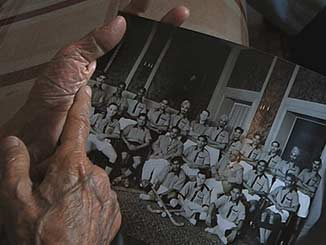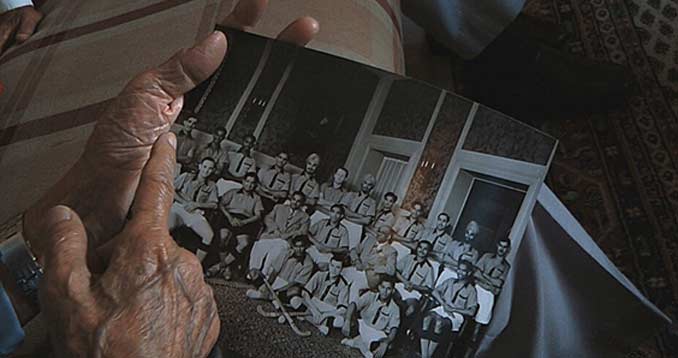

SAPAN News Taangh, or longing, is a heart-wrenching film about college friends who were separated in 1947 after the division of India and the birth of Pakistan. The 90-minute documentary by Bani Singh unfolds around the central figure of her father Grahnandan ‘Nandy’ Singh, a member of the legendary Indian hockey team that won Olympic gold medals in 1948 and 1952.
Nandy and his friends were students at Government College, Lahore, where they played on the college hockey team. They were separated from each other at the time of Partition.
This film follows these former sportsmen who still become tearful remembering each other and those events 75 years ago. I wonder, how could these people have held on to so much pain for so long?
Nandy Singh’s daughter Bani Singh, a space designer based in Bengaluru, sets out courageously to uncover the hidden truth and pain that her father had never shared with anyone. After Nandy has a stroke and loses the ability to speak, she sets off on a journey to meet some of his other team members in India and find a friend, Shah Rukh, who had stayed behind in Lahore after Partition.
Talking to Bani about those days, Nandy’s college mate Keshav Dutt in Calcutta remembers being alone and frightened in the summer of 1947. Hindus and Muslims in Lahore, who once lived like brothers, were thirsty for each other’s blood.
“Shah Rukh would come over to my place and stay awake all night so I could sleep,” he says.
Not only that, but a few days later, Shah Rukh got Dutt safely out of Lahore on a train to Amritsar and “probably even paid for the ticket”, he narrates. Since Dutt did not outwardly look like a Hindu, Shah Rukh got him to the station, telling gangs along the way that he was sending his friend over to India to bring back Muslim families.
Every scene in this intimately filmed documentary tugs at the heartstrings. The pain of separation felt so palpable to me that I wept with the characters.
I have no words to describe how I felt seeing my Lahore shot so beautifully. The streets of Purani (old) Anarkali, and ancient stories in these streets, and the melancholy in those narrow lanes.
Seeing my own old school Lady Maclagan at Laaj Road in Purani Anarkali brought tears to my eyes. That is where my mother was a teacher, treating me just like other students. We would celebrate duty day as ‘parhai ki chutti’ (freedom from studies). My late younger brother was at the school daycare, and I had to visit him at break time when all I wanted was to go have fun with the other girls. When I was done with my schooling there was no one to take care of him so he was moved to a special school.
I remember buying naan tikki for just 50 paise from the chaat wala outside campus with a huge cart; adding meethi chutney (sweet sauce) made it my dream plate.
The most famous figure of the school was Shukuntla, the hidden spirit, an unseen yet famous female character whose story everyone knew. At the time of Partition, this beautiful Hindu girl was in love with a Muslim boy. Not wanting to leave Lahore with her family, she jumped to her death from one of the old school buildings. It is said that her spirit appears at night on the top of that building even today.
Bani Singh’s documentary touched my heart in so many ways. I love how she presented Lahore, its people, the posters, the streets, and the candid shots with raw footage of Lahore from Tollinton Market to Food Street, from Waris Shah underpass to Government College Lahore, and Municipal Committee Hall to Bird Chowk. The scene of the rickshaw ride reminded me of my own student days when we used to take rickshaws to school with our late mother.
Historians tell us that Lahore derived its original name from Loh, the son of Rama, as mentioned in the Ramayan.
I am a proud Lahori when I see the samadhi (memorial) of Bhagat Singh, a hero of my late father, resting in peace just a few miles from my old residence in Samnabad.
Bani Singh’s portrayal makes me think: How can anyone love my Lahore so much? How can ‘strangers’ find themselves in my streets? Each character’s tears speak of pain. How can a stranger make his tears drop from my eyes?
Because my watan (homeland) was once his.
He too was a resident of this Purni street. This watan does not belong to anyone, the homeland belongs to all. And friendship, as Shah Rukh says, “is in the heart”.
Nandy Singh and his friends have gone to another world, unable to cross this borderline. They have now found eternal peace. They will not be longing for years just to embrace one another because they are now with the One who teaches us to love without these manmade “borders”. They don’t have any taangh or longing left in their hearts now.
The land of her ancestors lives on through Bani Singh.Thank you to Sapan Film Club for screening Taangh/Longing and also to Bani Singh for discussing the longing and drive people across the borders have for their loved ones back home.
Sara Arshad is a teacher, poet, and writer in Lahore, Pakistan.

Leave a Reply